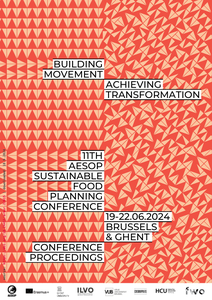Foodboek van de afstudeerders van HAS hogeschool 2020. Studenten presenteren hun ideeën en projecten met betrekking tot de voedselketen. Food book of the graduated students of HAS Universiry of Applied Sciences. Students present their ideas and projects concerning the food chain.
DOCUMENT

The increased generation of food waste is a global and national problem. The purpose of the study is to investigate the factors that influence food waste and the role of technology in tackling food waste in the Netherlands. One of the main findings of the research is food waste is that consumer food waste is mainly influenced by food passing expiry date, food that is left too long in the fridge and consumers buying too much food. In final household consumption, digital platforms and applications enable individuals to share and donate their food, thereby creating awareness on food waste prevention and the environmental benefits.
DOCUMENT
Tijdens de HAS Food Experience 2021 voert Marjo Baeten gesprekken over het ontwerpen van duurzame voedselsystemen. In gesprek met de gasten komt aan bod wat hun visie op de uitdagingen in food vandaag de dag is én welke impactvolle, creatieve en ondernemende oplossingen er zijn bedacht zijn.
LINK
Tijdens de HAS Food Experience 2021 voert Marjo Baeten gesprekken over genieten van eten, randvoorwaardelijk voor duurzaam eten, en het ontwikkelen van concepten.
LINK
With contributions from over 30 international legal scholars, this topical Research Handbook on International Food Law provides a reflective and crucial examination of the rules, power dynamics, legal doctrines, societal norms, and frameworks that govern the modern global food system. The Research Handbook analyses the interlinkages between producers and consumers of food, as well as the environmental effects of the global food network and the repercussions on human health. Chapters explore the development of food law and governance strategies, the regulation of novel foods, including insects, and the application of technology and science in food production, such as genetically engineered food. The insightful contributions examine the legal challenges facing the global food system and suggest practical recommendations for future research and reform. Providing a comprehensive and interdisciplinary perspective on the complex legal landscape of food production and consumption, this Research Handbook will be essential reading for students and scholars of food law, consumer law, public international law, and regulation and governance, as well as food system advocates, international lawyers, and policymakers.
LINK
Moral food lab: Transforming the food system with crowd-sourced ethics
LINK
In this masterclass, Toine Timmermans, director Stichting Samen tegen Voedselverspilling (Foundation Together against Food Waste), explains what is food waste , what the effects of food waste are on our environment, how much we waste and what we can do about it. He also gives many examples how we can reduce food waste.
DOCUMENT

Citizens living in food poverty can easily get caught up in a vicious cycle. Socio-economically disadvantaged people often rely on food assistance and are more likely to suffer from diseases caused by unhealthy diets, such as diabetes. They may also experience isolation and lack social networks, as they do not have the financial means to participate in social life. Moreover, this group is often overlooked in decision-making processes regarding healthy and sustainable food environments. To create equitable food environments in urban areas, it is crucial to incorporate the everyday challenges and needs of socioeconomically disadvantaged people. In our collaborative research, we explore the needs of socioeconomically disadvantaged people regarding a healthy and sustainable diet in Switzerland and the Netherlands. The aim is also to develop, in a participatory way, ideas on how to create more socially just and inclusive food environments.Keywords: food poverty, food environments, social participation, participatory action research
DOCUMENT

In this masterclass, Suzanne Klein-Gebbink, program manager of Circular Living Lab Food Valley and Lector Eric de Bruin from Aeres explain about food waste in practice: when is food wasted, why we should reduce it and how value can be created from food waste using the ladder of Lansink, which shows the value hierarchy of what we can do with food waste. Together Eric and Suzanne show examples of projects that look at different ways of creating value from food waste.
DOCUMENT

This publication follows and analysis the proces in the region Westerkwartier in the Netherlands in their effort to built a whole new regionale food chain. In this report there is a remarkeble role for the knowledge instutions on vocational and applied level.
DOCUMENT